Share

The Unconventional Soldier
S5 #071 Veterans
CONTENT
The guest today is Ben Skipper a freelance feature writer and author with books and articles published on art, military and field sports subjects. He is an Associate Member of Royal Aeronautical Society and the Pen and Sword Club for military journalists and writers. His interest in British armour was cemented by a visit to the King’s Royal Hussars in the early 1990s as an undergraduate in the Territorial Army. He joined the RAF in 1997, and served in conflict zones including Kosovo and Sierra Leone. He also played rugby for the RAF.
A Former Force Protection NCO Ben, suffered increasingly with a range of balance, muscular and co-ordination issues to the extent doctors thought he might have onset dementia. It was during tests, that an MRI scan picked up bright spots of damage in Ben's brain and it was found that Ben had experienced a traumatic brain injury during his days in the RAF.
Symptoms of his brain injury started to impact on his life and became progressively worse after leaving the Service in 2002.
Ben is also a freelance consultant academic specialising in Veteran social culture. He has written various papers regarding the symptomatic presentation and effects of combat-related PTSD, not only upon the individual but also on the family and community. This input has been sought and included in Lord Ashcroft's "The Veterans' Transition Review" (2014) and "The Value of Participation in University Armed Services Unit's" by Newcastle University. Other projects include a visual campaign promoting positive Veteran representation and an exhibition of contemporary Veteran Art.
He also finds time to be a County Member East Midlands Reserve Forces and Cadets Association who work to support the growth of the Reserves and Cadet Forces in Nottinghamshire.
On this podcast we discuss his forces background and work with Fallout which is a new collaborative historical studies enterprise featuring the work of Dr Philip W. Blood, Dustin Du Cane all working on the fringe of contemporary thought. Links to Fallout can be found in the show notes.
The main focus is on veterans however. We cover a variety of issues including public perception, politicisation, charities, armed forces covenant, do we need a vetterans minister and much more.
Ben's book choice on Desert Islands Dits is "The Darling Buds Of May" by H E Bates. My choice is "Schimitar into Stanley - One Soldier's Falklands War " by Roger Field.
Ben's webpage "I...am a Veteran" can be found at https://www.iamaveteran.co.uk/
WHERE TO GET OUR DESERT ISLAND DITS BOOK CHOICES
Most of our book recommendations can be bought via the Unconventional Soldier Bookshop. 10% of each purchase supports the pod and helps independent book stores on line sales.
"BUY ME A COFFEE"
If you want to support the podcast you can buy me a coffee here.
SOCIAL MEDIA
Instagram @the_unconventional_soldier_pod.
Facebook @lateo82.
Twitter @TheUCS473.
Download these and other platforms via Link Tree.
Email us: unconventionalsoldier@gmail.com.
This episode brought to you in association with ISARR a veteran owned company.
More episodes
View all episodes
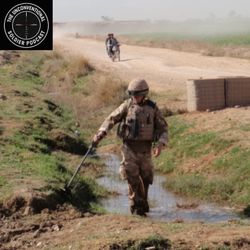
S6 #111 Defeating The Taliban Bomb Makers
01:34:18|CONTENTThe guest today is former Royal Engineer Brad Knight. On this episode we discuss his service with the Royal Engineers and his specialised role in counter IED search teams during the war in Afghanistan. Joining the army at 16 years old, he eventually transitioned from a driver to a lead searcher tasked with detecting IEDs. The conversation highlights the high-stakes nature and extreme psychological pressure of the role. Brad describes the intense cooperation between searchers and EOD teams noting how the tactics were rooted in British military experiences from Northern Ireland. He shares stories of active combat and narrow escapes, illustrating the sobering reality that a single lapse in concentration could result in death or permanent injury. Finally we discuss the complex legacy of a conflict that remains a defining chapter for the soldiers that served there. Brad's book choice on Desert Island Dits is "Chaos the truth behind the Manson Murders" by Tom O'Neill and Dan Piepenbring. My choice is Brad's Book "Brimstone - A searchers war hunting the Taliban's silent killers.".WHERE TO GET OUR DESERT ISLAND DITS BOOK CHOICESMost of our book recommendations can be bought via the Unconventional Soldier Bookshop. 10% of each purchase supports the pod and helps independent book stores on line sales. "BUY ME A COFFEE"If you want to support the podcast you can buy me a coffee here.SOCIAL MEDIAInstagram @the_unconventional_soldier_pod.Facebook @lateo82. Twitter @TheUCS473.Download these and other platforms via Link Tree.Email us: unconventionalsoldier@gmail.com. This episode brought to you in association with ISARR a veteran owned company.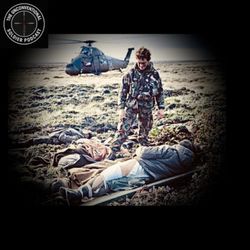
S6 #110 Terry Powell DCM: SBS in The Falklands War (Part 5)
01:24:47|CONTENTThis pod is the fifth in a series featuring former Royal Marine, SBS soldier and clearance diver Terry Powell. In this episode he recounts his deployment with the SBS during the 1982 Falklands War. Terry describes the chaotic initial mobilisation, including a discarded high-stakes plan to parachute directly into Stanley, before detailng the strategic shift to clandestine reconnaissance and direct action. Key operations such as Operation Kettle Drum and the assault on Fanning Head are highlighted, illustrating the intense risks and the technological limitations of the era, such as relying on Morse code and rudimentary equipment. The narrative emphasizes the bravery of the task force and the critical, often unrecognized assistance provided by local Falkland Islanders who hosted special forces at great personal peril. Ultimately, Terry provides a granular look at the strategic challenges and the profound sense of camaraderie that defined elite maritime operations during the South Atlantic conflict.WHERE TO GET OUR DESERT ISLAND DITS BOOK CHOICESMost of our book recommendations can be bought via the Unconventional Soldier Bookshop. 10% of each purchase supports the pod and helps independent book stores on line sales. "BUY ME A COFFEE"If you want to support the podcast you can buy me a coffee here.SOCIAL MEDIAInstagram @the_unconventional_soldier_pod.Facebook @lateo82. Twitter @TheUCS473.Download these and other platforms via Link Tree.Email us: unconventionalsoldier@gmail.com. This episode brought to you in association with ISARR a veteran owned company.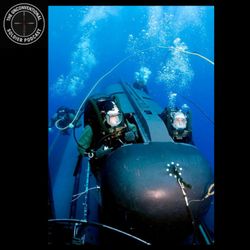
S6 #109 Terry Powell DCM: Swimmer Delivery Vehicle Ops (Part 4)
52:50|CONTENTThis pod is the fourth in a series featuring former Royal Marine, SBS soldier and clearance diver Terry Powell. In this episode Terry recounts his extensive career in specialised underwater operations and military training. He highlights his role in the early development of the Swimmer Delivery Vehicle (SDV), a craft he helped transform into a vital tactical asset through grueling human endurance trials in near-freezing water. The pod details the physical and psychological pressures of oxygen toxicity during deep-sea trials with the US Navy and the necessity of passing conventional command courses for promotion. Terry also shares operational stories from Arctic warfare training in Norway, emphasizing the life-saving importance of pilot expertise and small-unit cohesion in extreme environments. Throughout he reflects on the shift toward professional accountability and the technical complexity of modern maritime sabotage and strategic target analysis.WHERE TO GET OUR DESERT ISLAND DITS BOOK CHOICESMost of our book recommendations can be bought via the Unconventional Soldier Bookshop. 10% of each purchase supports the pod and helps independent book stores on line sales. "BUY ME A COFFEE"If you want to support the podcast you can buy me a coffee here.SOCIAL MEDIAInstagram @the_unconventional_soldier_pod.Facebook @lateo82. Twitter @TheUCS473.Download these and other platforms via Link Tree.Email us: unconventionalsoldier@gmail.com. This episode brought to you in association with ISARR a veteran owned company.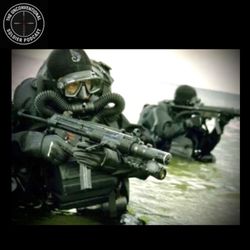
S6 #108 Terry Powell DCM: Life In The SBS (Part 3)
53:27|CONTENTThis pod is the third of a series featuring former Royal Marine, SBS soldier and clearance diver Terry Powell. After passing SBS selection Terry underwent diverse and rigorous training, including HALO/HAHO parachuting and advanced paramedic certification. The narrative also highlights his involvement in testing experimental diving equipment and working with US Navy SEALs to refine unconventional warfare tactics. Terry's account emphasizes the evolution of special forces technology including the implementation of the Swimmer Delivery Vehicle (SDV). This a firsthand perspective on the physical and technical demands placed on elite British maritime operatives during the 1980s.WHERE TO GET OUR DESERT ISLAND DITS BOOK CHOICESMost of our book recommendations can be bought via the Unconventional Soldier Bookshop. 10% of each purchase supports the pod and helps independent book stores on line sales. "BUY ME A COFFEE"If you want to support the podcast you can buy me a coffee here.SOCIAL MEDIAInstagram @the_unconventional_soldier_pod.Facebook @lateo82. Twitter @TheUCS473.Download these and other platforms via Link Tree.Email us: unconventionalsoldier@gmail.com. This episode brought to you in association with ISARR a veteran owned company.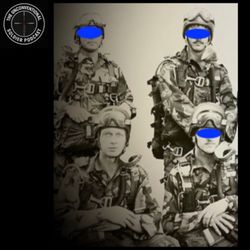
S6 #107 Terry Powell DCM: SBS Selection (Part 2)
01:12:40|CONTENTThis pod is the second of a series featuring former Royal Marine, SBS soldier and clearance diver Terry Powell. In this episode Terry describes the intense selection process and evolving identity of the Special Boat Service (SBS). He details the rigorous physical and psychological trials candidates endure, including underwater navigation, demolitions, and resistance-to-interrogation training. He explains the transition of the unit from a purely Royal Marine entity to a tri-service organization, noting the emotional impact of adopting a unique cap badge separate from the corps. The discussion also addresses the long-term toll of special forces operations, highlighting issues like PTSD, physical injuries, and the dangers of seeking celebrity status. Ultimately, Terry emphasises that mental resilience and personal integrity are among the most vital traits for those operating in such high-stakes environments.WHERE TO GET OUR DESERT ISLAND DITS BOOK CHOICESMost of our book recommendations can be bought via the Unconventional Soldier Bookshop. 10% of each purchase supports the pod and helps independent book stores on line sales. "BUY ME A COFFEE"If you want to support the podcast you can buy me a coffee here.SOCIAL MEDIAInstagram @the_unconventional_soldier_pod.Facebook @lateo82. Twitter @TheUCS473.Download these and other platforms via Link Tree.Email us: unconventionalsoldier@gmail.com. This episode brought to you in association with ISARR a veteran owned company.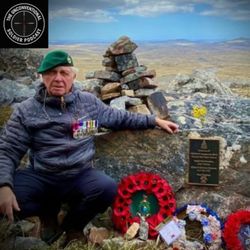
S6 #106 Terry Powell DCM: SBS & Clearance Diver (Part 1)
01:45:55|CONTENTThis pod is the first of a series featuring former Royal Marine, SBS soldier and clearance diver Terry Powell. Terry joined the Corps in 1972 and after basic training was posted to 45 Comando RM before passing selection for the SBS in 1979. He remained in the unit until 1998, including a deployment on operations to the Falklands on Operation CORPORATE in 1982. Terry was then seconded to the fleet diving group as a clearance diver where he remained until 1991. During this time, he deployed to the first Gulf War and was awarded the Distinguished Conduct Medal, while operating as a member of Fleet Diving Unit B supervising diving operations from Gemini craft to clear enemy mines and EOD. Later that year, he returned as a project director on support squadron before moving on to be security and projects director in 1994, where he remained until 1998. On this first episode we discuss his early life and joining the Corps.WHERE TO GET OUR DESERT ISLAND DITS BOOK CHOICESMost of our book recommendations can be bought via the Unconventional Soldier Bookshop. 10% of each purchase supports the pod and helps independent book stores on line sales. "BUY ME A COFFEE"If you want to support the podcast you can buy me a coffee here.SOCIAL MEDIAInstagram @the_unconventional_soldier_pod.Facebook @lateo82. Twitter @TheUCS473.Download these and other platforms via Link Tree.Email us: unconventionalsoldier@gmail.com. This episode brought to you in association with ISARR a veteran owned company.
S6 #105 Richard Westley OBE MC: Operations In Northern Ireland, Bosnia & Afghanistan
01:42:10|CONTENTMy guest today is former infantry officer Richard Westley OBE MC who recounts his extensive career in the British Army, starting with his motivation to join the Royal Welsh Fusiliers after Sandhurst in 1984. Richard commanded soldiers on operations at every rank from Second Lieutenant to Colonel in environments as disparate as northern Ireland, Albania, Afghanistan, Cote d’Ivoire and the Balkans. He discusses his formative experiences in Northern Ireland, emphasizing the difficulties faced by young officers and the critical need to earn the respect of seasoned Welsh infantry soldiers. In 1995 surrounded by the advancing Bosnian Serb Army in the exposed enclave of Gorazde his company fought to prevent the fall of the Town and saved its people from the fate of neighbouring Srebrenica. For his part in this he was awarded the Military Cross.In 2007 he deployed with his battle group to Helmand province in Afghanistan where they occupied Gereshk, driving back the Taliban and securing the erstwhile financial capital of the Province. Setting the conditions for the development of the town. He was appointed an OBE for this tour. Richard retired from the Army in 2010 having been responsible for all pre-deployment training for UK forces bound for Iraq and Afghanistan for the previous 3 years.Richard's book choice on Desert Islands Dits is "The Catcher In The Rye" by JD Salinger. My choice is Ben Barry's book "The Rise And Fall Of The British Army 1975 - 2025".WHERE TO GET OUR DESERT ISLAND DITS BOOK CHOICESMost of our book recommendations can be bought via the Unconventional Soldier Bookshop. 10% of each purchase supports the pod and helps independent book stores on line sales. "BUY ME A COFFEE"If you want to support the podcast you can buy me a coffee here.SOCIAL MEDIAInstagram @the_unconventional_soldier_pod.Facebook @lateo82. Twitter @TheUCS473.Download these and other platforms via Link Tree.Email us: unconventionalsoldier@gmail.com. This episode brought to you in association with ISARR a veteran owned company.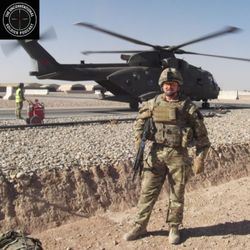
S6 #104 The Afghanistan Veterans Community
01:24:44|CONTENTThe guest today is former soldier Jonny Ball who served in the Princess of Wales’s Royal Regiment and the Intelligence Corps deploying on operations in Northern Ireland and Afghanistan before being medically discharged in 2024. An expert at election law, campaigns and community engagement. He worked for a decade in politics and ran elections for some of the best known names in UK politics. He also hosts the Veterans In Politics podcast. Jonny is a co-founder of the service charity UK Afghanistan Veterans Community and is heavily involved in veterans affairs including being the MD of Mission Community a brand of Mission Motorsport- The Forces Motorsport Charity. Injured in a motorcycle accident in 2019 he has participated in the Invictus Games and has since become involved in the Invictus Birmingham 2027 Focus Group. All of which we discuss on the pod.Jonny's book choice on Desert Islands Dits is "Escape From Kabul: The Inside Story" by Levison Wood and Geraint Jones.Links:Afghanistan Veterans Community - https://www.ukafghanveteranscommunity.org/Mission Community - https://www.missioncommunity.org/Veterans In Politics Podcast - https://open.spotify.com/show/3bjq2Pk96oZxEB0LRA8CUlWHERE TO GET OUR DESERT ISLAND DITS BOOK CHOICESMost of our book recommendations can be bought via the Unconventional Soldier Bookshop. 10% of each purchase supports the pod and helps independent book stores on line sales. "BUY ME A COFFEE"If you want to support the podcast you can buy me a coffee here.SOCIAL MEDIAInstagram @the_unconventional_soldier_pod.Facebook @lateo82. Twitter @TheUCS473.Download these and other platforms via Link Tree.Email us: unconventionalsoldier@gmail.com. This episode brought to you in association with ISARR a veteran owned company.
S6 #103 Achtung Pig: Life In BAOR & Northern Ireland
37:45|CONTENTThe guest today is former soldier and author James Lee. James was my guest on podcast 38 where we discussed his first book about his tour in Afghanistan called "Licking The Taliban’s Flip Flop" and also on pod 84 where we discussed his second volume "Sleeping in The ditch With Slobodan Milosevic" about his tour in Bosnia and Croatia in the 90s. on this episode we discuss his new book "Achtung Pig!" the final installment of his military memoir "The Hurry Up And Wait Trilogy". The discussion centers on James’s experiences as a young soldier posted to the British Army of the Rhine (BAOR) in Germany following the collapse of the Soviet Union. We touch on the profound drinking culture and the nostalgia surrounding iconic BAOR equipment and personalities like Wolfgang and his bratty wagon. James contrasts the life in Germany with his challenging first tour tour during in Northern Ireland (OP Banner). Get in touch with James at:Author Websitehttps://www.jamesleeauthor.co.uk/Book Storehttps://james-lee.sumupstore.com/Flying Websitehttps://www.buddysaviation.club/WHERE TO GET OUR DESERT ISLAND DITS BOOK CHOICESMost of our book recommendations can be bought via the Unconventional Soldier Bookshop. 10% of each purchase supports the pod and helps independent book stores on line sales. "BUY ME A COFFEE"If you want to support the podcast you can buy me a coffee here.SOCIAL MEDIAInstagram @the_unconventional_soldier_pod.Facebook @lateo82. Twitter @TheUCS473.Download these and other platforms via Link Tree.Email us: unconventionalsoldier@gmail.com. This episode brought to you in association with ISARR a veteran owned company.